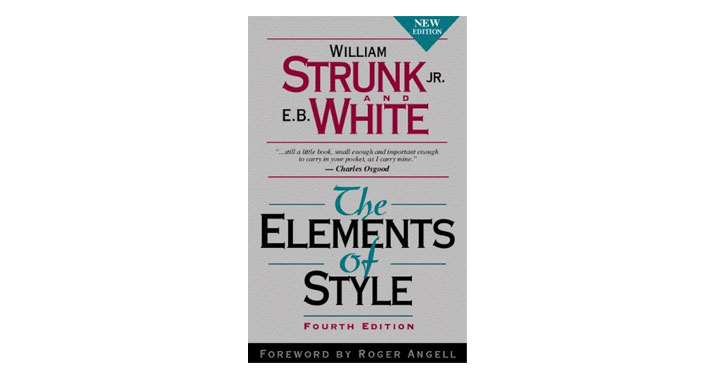If I had to choose one desert island book on writing, what would it be?
I’d obviously be so busy attempting to catch fish or patch up my shack’s roof that time would be rationed.
So what better choice than Strunk & White’s The Elements of Style
It’s short on words but long on content.
William Strunk was Professor of English at Cornell University. Elements of Style started life as a 43-page book, printed privately in 1918 for Strunk’s students. After his death in 1945, a former pupil, E. B. White (author of Charlotte’s Web), expanded and revised the book, which was published by Macmillan in 1959.
The Elements of Style has been in print ever since. It’s sold more than ten million copies.
This is not a ‘on the one hand…on the other’-type of style guide. It’s gloriously prescriptive.
Its devotees range from Time magazine (‘one of the 100 best and most influential books written in English since 1923’) to Stephen King (‘little or no detectable bullshit in this book…Every aspiring writer should read The Elements of Style).
Fans of George Orwell’s essay ‘Politics and the English Language’ (1946) and its famous six rules will enjoy this book.
Here’s an extract from one of Strunk & White’s most famous precepts, ‘Omit Needless Words’.
Omit Needless Words
Vigorous writing is concise. A sentence should contain no unnecessary words, a paragraph no unnecessary sentences, for the same reason that a drawing should have no unnecessary lines and a machine no unnecessary parts. This requires not that the writer make all sentences short, or avoid all detail and treat subjects only in outline, but that every word tell.
Many expressions in common use violate this principle.
- the question as to whether / whether (the question whether)
- there is no doubt but that / no doubt (doubtless)
- used for fuel purposes / used for fuel
- he is a man who / he
- in a hasty manner / hastily
- this is a subject that / this subject
- Her story is a strange one. / Her story is strange.
- the reason why is that / because
- The fact that is an especially debilitating expression. It should be revised out of every sentence in which it occurs.
- owing to the fact that / since (because)
- in spite of the fact that / though (although)
- call your attention to the fact that / remind you (notify you)
There’s much more…
And just to recap on Orwell’s six rules.
Orwell’s Six Rules
- (i) Never use a metaphor, simile, or other figure of speech which you are used to seeing in print.
- (ii) Never use a long word where a short one will do.
- (iii) If it is possible to cut a word out, always cut it out.
- (iv) Never use the passive where you can use the active.
- (v) Never use a foreign phrase, a scientific word, or a jargon word if you can think of an everyday English equivalent.
- (vi) Break any of these rules sooner than say anything outright barbarous.
Note how both Orwell and Strunk & White advocate editorial secateurs: ‘Omit needless words’ and ‘If it is possible to cut a word out, always cut it out’.
I can’t remember who advised authors to imagine earning a pound – well, we’re authors, not bankers! – for every word they cut out. That’s always resonated with me.

